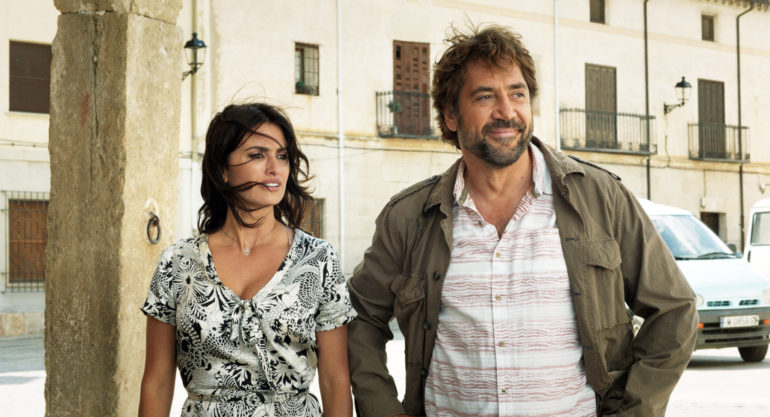Its cosmopolitan credentials front and centre, the 71st Festival de Cannes opens on May 8th with Todos lo saben (Everybody Knows), a Spanish psychological thriller, directed by an Iranian and produced by a French company. After winning Best Actor and Best Screenplay with The Salesman in 2016, Asghar Farhadi returns to the Croisette with another tense, layered family-centric drama starring Penelope Cruz and Javier Bardem.
The press release pitch tells us the story “… follows Laura who travels with her family from Buenos Aires to the village where she was born, on a Spanish vineyard, to attend her sister’s wedding but unexpected events lead this gathering towards a crisis which exposes the hidden past of the family.”
“This is Asghar Farhadi’s most ambitious film yet” recounts French producer Alexandre Mallet-Guy of Memento Films who also produced Farhadi’s two previous films. “Everybody Knows is not only a gripping thriller with multiple twists, but also an amazing ensemble portrait dominated by the performances of Penélope Cruz, Javier Bardem and Ricardo Darín. Moving from Tehran to the Spanish countryside, Asghar Farhadi has lost none of his incredible talent as an observer of the human soul, which twice earned him the Academy Award® for Best Foreign Language Film for A Separation in 2012 and The Salesman in 2017.”
Now just 47, Farhadi has already had an impressive award-laden career among A-list festivals. Starting out in TV drama in Iran, he’s picked up prizes in Pusan, Moscow and Chicago for his first two films and came to front line prominence with his third film, About Elly, winning the Berlinale Silver Bear in 2009. He followed in 2011 taking the Golden Bear for his magister opus, The Separation. From these Berlin successes, Farhadi migrated to the Cannes launch pad with his next film The Past, garnering Berenice Bejo a Best Actress award. Situated in a Paris suburb and shot in French, The Past was his first foray into directing in a language other than Farsi and, though solid enough, it didn’t pack quite the impact of his Persian pictures, perhaps because of the less layered storyline or because it also lacked the intriguing discoveries about contemporary Iranian life found in About Elly and The Separation, notably its social structure and surprising interpersonal behavioural parallels with Western culture.
Farhadi’s trademark storyline, if not his obsession, in whatever language, always involves revealing the underlying fragility of apparently solid relations when they are confronted with an unexpected tragedy. In The Salesman it involves the tectonic shift of a minor earthquake that cracks the foundations of an apartment building, forcing a family involved in the arts to move to the discomfort of less convenient lower-class accommodation. Though highly effective and even more complex than his previous films in Farsi, it seemed just little contrived, as if Farhadi were following his own recipe.
For ambitious directors —whether the impetus be artistic excellence or industrial imperatives— renewal and change are the only ways forward. This also begs the obvious question of how a proven great filmmaker can direct actors in a language for which they don’t share the subtleties and nuances. Cannes, the cinematic Tower of Babel that it is, remains the prime testing ground for such linguistic ventures. In the day, the likes of Fellini succeeded by simply not caring and relying on virtuosity and (badly) dubbing the likes of Anthony Quinn and Richard Basehart in Italian. Wenders pulled it off (up to Paris, Texas, in any case) by immersing himself in American culture while sustaining his alien perspective. In more recent years Sorrentino pretty much failed with This Must Be the Place and, though many bought into Youth’s authenticity, others missed the Italian-icity. And, in spite of (or maybe because of) their reverence for American cinema, French auteurs rarely manage the transition well. Arnaud Desplechin’s Jimmy P, even with the charisma of Benicio Del Toro was at best naïve.
Next up, we will soon know whether —after the Palme success of Dheepan in 2015 and Grand Prix for The Prophet in 2009— Jacques Audiard’s gold digging (sic) western, Sisters and Brothers, starring Jake Gyllenhaal and Joaquin Phoenix, will again be a Palme d’Or contender.
Even choosing among the best talents —the likes of Farhadi and Audiard— the Cannes Selection is a very hit or miss affair but offers adventure and a refreshingly European alternative to the fiercely marketed Hollywood industry.
Thus, while the Best Picture Oscar is predictable, in Cannes, Everybody Knows that nobody knows …anything.


